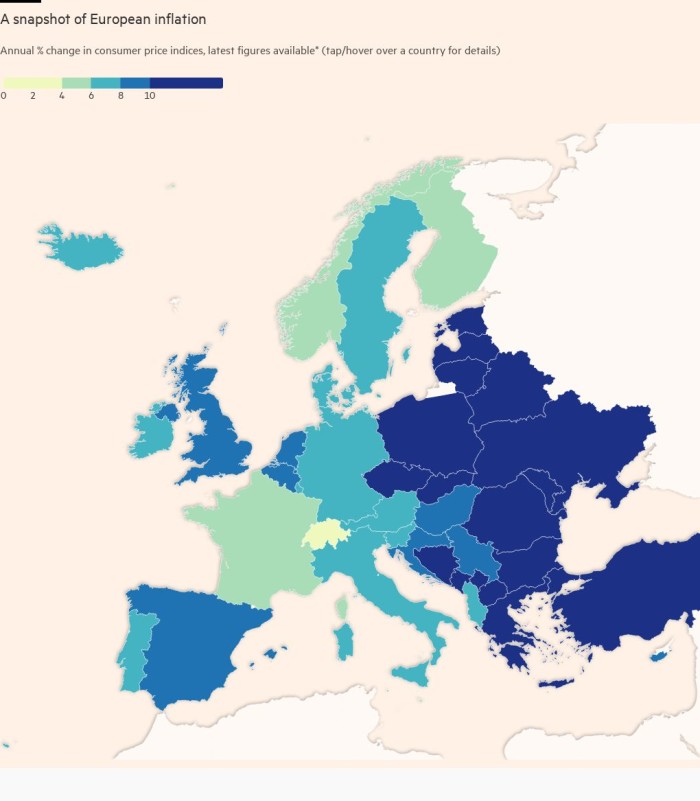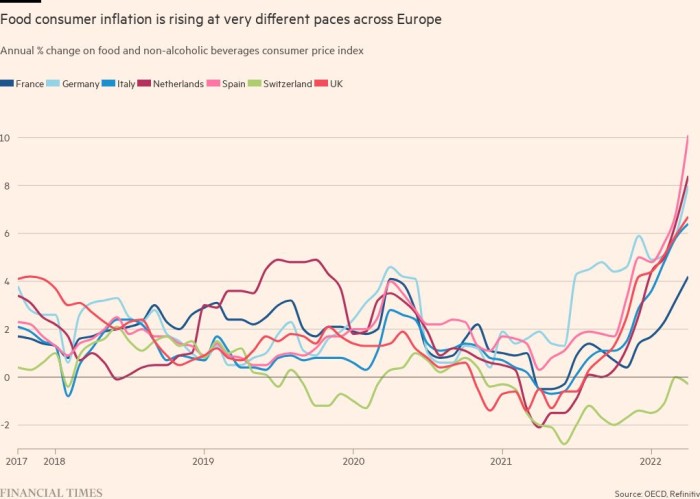For many Europeans, the nearer they are to Russia, the faster their cost of living is rising.
The extent of a country’s dependence on Russia for its energy needs is a key factor, but not the only one, deciding how fast inflation has risen since Moscow’s full invasion of Ukraine in February sent fossil fuel prices soaring.
The Baltic states and the EU’s other eastern countries have been hit hard, as has Ukraine itself. Many of these nations have close ties to Russia and its energy supplies. But their higher inflation also reflects stronger recent economic growth and tighter job markets.
“As growth and labour markets recover from the Covid crisis and energy prices soar, European inflation has hit new records,” said Anna Titareva, European economist at UBS. “The key drag on household incomes in the eurozone has been a sharp rise in energy prices.”
A third of the EU’s 27 members have experienced double-digit inflation, notably Estonia, where consumer prices are rising at an annual rate of almost 19 per cent. Poland’s prime minister Mateusz Morawiecki has started referring to “Putinflation” as he looks to pin the blame for sharply higher prices on Russian president Vladimir Putin’s invasion.
The most extreme inflation, however, is in Turkey, where a collapse in the value of the lira and the fallout from the Ukraine war has sent prices up 70 per cent in the year to April.
Other countries faced with surging inflation are also heavily reliant on Russia for their energy. Almost all of Lithuania’s energy imports come from Russia, while in Slovakia and Greece it is close to half.
Energy accounted for more than half the overall rise in eurozone inflation to record levels of 7.4 per cent in the past year, according to Eurostat. But other products are also becoming more costly, notably food, alcohol and tobacco, which made up almost a fifth of annual price growth.
In the US, inflation has been higher than in the eurozone, hitting 8.3 per cent in April. But much less of this is because of energy, which only accounts for a third of US price growth over the past year. This illustrates how the US is more energy self-sufficient that Europe but also that its economy has overheated more, leading to sharp rises in the price of non-energy goods, services and wages.
While the latest bout of inflation is spread across Europe, it is more muted in some countries, notably Switzerland and France.
The recent strength of the Swiss currency, considered a safe haven in times of crisis, has been a big factor limiting inflation in the country to 2.5 per cent. “It’s clear a strong franc reduces the price of imports,” Swiss central bank board member Andréa Maechler told a conference this month.
Switzerland’s energy mix is another factor, as it generates much of its electricity from renewable sources such as hydropower or nuclear energy rather than fossil fuels.
Swiss consumer prices were “extremely high” before this global bout of inflation, so the country was “starting from a different point” with less capacity for companies to raise them further, noted Nadia Gharbi, an economist at Pictet Wealth Management in Geneva.
In France, consumer price growth is a third lower than in Germany and half the rate in the Netherlands.
“Government policy is a major part of the explanation of why French inflation is lower,” said Holger Schmieding, chief economist at Berenberg in London, pointing to the cap on household electricity bills.
This effect was mirrored in Spain, where a cap on gas prices lowered the amount households paid for energy and water last month, helping overall inflation drop back from a 37-year high the previous month.
Measures to shield households from surging electricity and fuel costs led overall eurozone energy inflation to slow in April, but it remained elevated at 37.5 per cent, far above earlier levels in the eurozone’s 23-year history.
The pressure was even higher in the Netherlands, where consumer energy prices increased 83 per cent in the year to April, posing a challenge for a country that imports about half its energy from Russia. Prime minister Mark Rutte said recently that the Dutch must accept being “a little poorer”.
In the UK, energy has been a smaller proportion of overall inflation. But the lifting of an energy price cap played a big role in sending price growth in the country to a 40-year high of 9 per cent in April.
Food prices in Britain are also rising sharply, up 6.7 per cent, prompting Bank of England governor Andrew Bailey to apologise this week for being “apocalyptic” when discussing the impact of Ukraine, a big producer of wheat, being unable to export.
Prices of food and non-alcoholic beverages rose even faster in the eurozone. Schmieding said this could continue to accelerate as “pipeline pressures on food producer prices have not fully hit the consumer yet”.
Food inflation hits households in poorer regions hardest as they spend a bigger share of their income on essentials. Spain, Portugal, Greece, Poland and the Baltic countries were among the nations exposed to double-digit increases in the year to April.
The EU is pushing to reduce its reliance on Russian energy, phasing in a ban on coal imports from the country and working on a similar move for oil.
Even though alternative sources of fossil fuels are likely to be more expensive, and a severing of Russian gas supplies could cause a full-blown energy crisis in Europe, most economists expect inflation to peak this summer and to fall steadily over the rest of the year.
“Providing we don’t have an escalation of the conflict in Ukraine and another surge in energy prices, I think we’ll soon see a peak and then a decline in inflation,” said Pictet’s Gharbi. “Each country’s own policy response and energy mix will be quite important in deciding how fast it falls.”





